Amnesty urges Singapore to stop executions
SINGAPORE, Jan 14, 2009 (AFP) - Human rights watchdog Amnesty International on Wednesday asked Singapore to make public "comprehensive information" about its use of the death penalty and again urged the government to stop executions.
Singapore's continued use of the death penalty for criminal offences, including drug trafficking, goes against a global trend that has seen several countries abolish capital punishment, Amnesty said in a statement. (Jacob: See below for the statement)
"Amnesty International recognises the seriousness of these crimes and supports all calls for justice," the London-based watchdog said.
But it said it "opposes the death penalty in all cases as a violation of the most fundamental human right: the right to life."
Amnesty said it had asked Singapore to make public "comprehensive information about the state's use of the death penalty" but the government had yet to provide annual statistics from 1993 to the present.
The rights watchdog said a Ghanian man, Chijioke Stephen Obioha, 20, was sentenced in December to hang for trafficking of cannabis and his alleged accomplice, a Zambian woman, was feared to be given the death penalty as well.
The death penalty is mandatory for trafficking more than 15 grams (half an ounce) of heroin, 30 grams of cocaine and 500 grams of cannabis.
Singapore's Ministry of Home Affairs did not immediately reply to AFP on its response to the latest criticism, which followed last week's hanging of a gangster for the gunning down of a nightclub owner.
Amnesty said Singapore, with a population of more than four million, has one of the highest per capita execution rates in the world. Singapore executed 420 people between 1991 and 2004, Amnesty said.
The Singapore government maintains capital punishment is important in keeping crime down and a strong deterrent to organised crime gangs.
Singapore is one of nine states in the Asia Pacific region that still have the death penalty, Amnesty said.
Singapore: Executions since December defy global trend
Amnesty International
Public Statement, 13 Jan 2009
Singapore, estimated to have one of the highest per capita execution rates in the world, should stop its use of the death penalty and instead join the 138 states throughout the world that have ceased executions in law or practice, said Amnesty International.
The city-state, with a population of 4.6 million, has executed at least 420 people since 1991. Singapore has condemned at least three people to die since 18 December, when the United Nations General Assembly overwhelmingly approved the “Moratorium on the use of the death penalty”. Singapore strongly criticized the resolution. At least two people have been executed since then.
The media reported the execution of Singaporean Moahammed Ali Johari, on 19 December for murder. Tan Chor Jin, a Singaporean man, was hanged on 9 January for murder. On 30 December, the High Court sentenced to death Chijioke Stephen Obioha, a 20-year old Ghanaian man, for trafficking cannabis. His alleged accomplice, a Zambian woman, was not mentioned in recent media reports, but because drug trafficking carries a mandatory death sentence in Singapore, it is feared that she will be given the death penalty as well.
Amnesty International recognises the seriousness of these crimes and supports all calls for justice. Amnesty International, however, opposes the death penalty in all cases as a violation of the most fundamental human right: the right to life. It is the ultimate cruel, inhuman and degrading punishment and there is no escaping the risk of error, which can lead to the execution of an innocent person.
Most death sentences in Singapore follow convictions for drug trafficking. The Misuse of Drugs Act provides for mandatory death sentences for at least 20 different offences and contains a series of presumptions which shift the burden of proof from the prosecution to the defence.
The UN Special Rapporteur on extrajudicial, summary or arbitrary executions has called for the death penalty to be eliminated for drug-related offences and has argued that the mandatory nature of the death sentence is a violation of international legal standards.
Singapore’s policies and practice bucks the solid and long-standing trend towards global abolition of the death penalty. When the Universal Declaration of Human Rights was adopted in 1948, eight countries had abolished the death penalty in law or practice. Sixty years later, the number stands at 138. Within the Asia Pacific region, Singapore is one of 9 states that retain the death penalty in law and practice. 27 states in the region have either abolished the death penalty or are holding a de facto moratorium.
As not all sentences and executions are reported publicly, it is possible that there have been more death penalty cases in the last few weeks. Amnesty International has requested that the Singapore government make public comprehensive information about the state’s use of the death penalty. Singapore has yet to publicly provide the requested annual statistics covering the period from 1993 to the present day.
Last post here
16 years ago














No comments:
Post a Comment